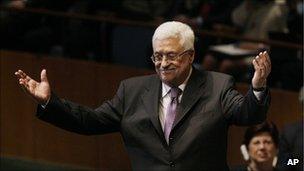Palestinian statehood bid: Useful points scored at UN
- Published

Mahmoud Abbas was met by a standing ovation at the UN headquarters
Israeli Prime Minister Benjamin Netanyahu told the UN General Assembly that it was a theatre of the absurd.
Essential - or absurd - it's certainly theatrical. The Palestinians ostentatiously sent only a junior official to take notes while Mr Netanyahu was speaking.
When Iran's President Mahmoud Ahmadinejad launched his usual attack on the West and all it has ever done, the countries he insulted stalked out of the chamber. So many left, it looked as if someone had sounded the dinner bell and they thought the food would run out.
Most of the assembled delegates, normally polite but rarely animated, stood up to cheer and clap when the Palestinian leader Mahmoud Abbas came to the podium to declare his application for membership. The American delegation, grim-faced, sat on their hands.
The Obama administration had been working very hard, and to no avail, to persuade the Palestinians not to apply.
President Barack Obama says that now the US will veto the application if ever it comes to the vote in the Security Council. He made a speech that was so pro-Israeli it shocked even the Israelis.
The day before the current front runner for the Republican Presidential nomination, Gov Rick Perry, had accused President Obama of appeasing the Palestinians and betraying Israel.
Next year's US presidential race may be close and Mr Obama and the Democrats need Israel's many friends in this country to vote for them.
Useful points
As always, domestic politics are shaping foreign policy.
A major reason why Mr Netanyahu is refusing to make concessions that might get the Palestinians back to the table is the fact he needs to protect his right-wing political base from the depredations of his rival, Avigdor Lieberman, who's also Israel's foreign minister.
It was noticeable how Mr Lieberman didn't clap at some of his prime minister's applause lines - while the rest of the Israeli delegation worked hard to make some noise in a hall that was otherwise resoundingly silent during his speech.
Mr Abbas also has a domestic audience to satisfy. A major reason why he resisted American pressure to apply to the UN for membership was the fact that he is perceived even by his own supporters as weak. The calculation was that his presidency might not survive another climbdown.
But he didn't buckle, so his supporters cheered and even wept when they gathered to watch the speech around a big screen in Ramallah in the West Bank.
The Palestinians have scored some useful points this week.
By applying for UN membership, and defying the Americans, they have put the issue of their independence back on to the international agenda - and given themselves, in their own eyes, a little more backbone.
Israel can take away President Obama's speech. One Israeli journalist quipped that all the president lacked was a framed portrait with him on the podium of Theodor Herzl, the founder of the Zionist movement.
For the delegations, the UN General Assembly is a time of endless meetings. One western diplomat I know calls it whirring. British Foreign Secretary William Hague told me he had been to 70 meetings this week.
Anodyne reading
The members of the so-called Quartet of the EU, Russia, the UN and the US have been engaged in particularly intensive wrangling over a joint statement to present to the Israelis and the Palestinians to encourage to revive the currently moribund peace process.
Finally, as many delegates were preparing to go home late on Friday afternoon, they managed some words that are supposed to be the basis for diplomatic action to get the two sides talking.
The Quartet statement asks for a meeting between the two sides within a month, proposals within three months, and progress within six months. That would be followed by a peace conference in Moscow and a peace agreement by the end of next year.
It is not the first 12-month deadline for the creation of a Palestinian state and a Middle East peace treaty. This week last year, President Obama called for a Palestinian state within 12 months. His predecessor George Bush said 12 months before he left office that there would be a Palestinian state within a year.
Let's hope this time it works. The region needs peace, and the conflict at the heart of so much poison needs to be ended before more people die.
But it took the Quartet a week of intensive meetings to find a common denominator. It's clear they do not agree on much.
Their statement makes anodyne reading. It lacks the substance and determination to spend political capital that will be essential if the Israelis and the Palestinians are really going to make a deal within a year.
If the Quartet is finding it so hard to agree on a couple of hundred key words, how on earth are they going to persuade the Israelis and the Palestinians to do a deal that still evades them almost 20 years after they started talking peace?